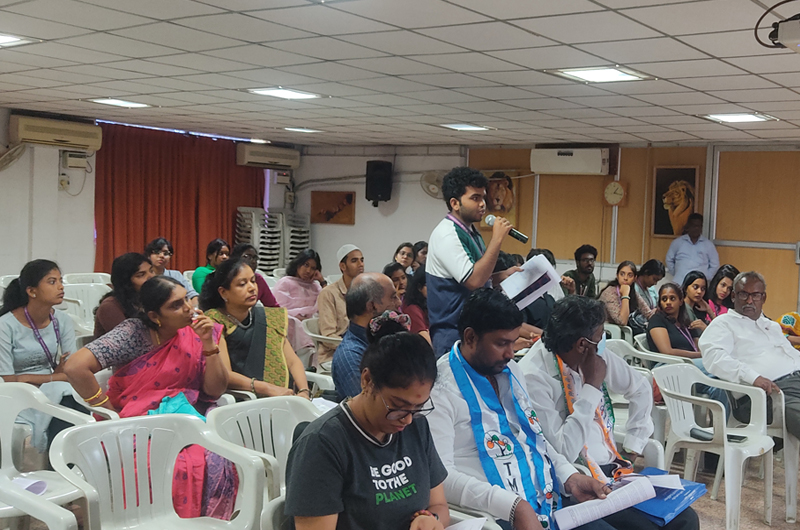In 1999, the CPR Environmental Education Centre (CPREEC) in Chennai had organised a meeting with concerned citizens, NGOs, environmentalists and the media to discuss and finalise what was then called the Green Charter. The charter was sent to the political parties asking them to include the points mentioned, in their election manifestos. After 25 years, on January 24, a consultation workshop titled Green Manifesto was organised by CPREEC in association with the Council for Green Revolution, Hyderabad, and the Centre for Earth Leadership and Sustainability. Here are extracts from the note (edited) about the event sent to us by P. Sudhakar, director, CPREEC
There are many people who continue to deny the existence of a climate crisis and environmental degradation. Some of the people who are convinced, are not motivated enough to take action. We believe one reason for that could be how the information is relayed. Statistics of disaster or environmental destruction have rarely worked on people, especially if the numbers and consequences are too big to comprehend. Experiences and travails from extreme weather phenomena and direct suffering in Chennai, India and elsewhere are definitely helping in increasing consciousness, but hopefully there are also other ways. One of the ways we thought is through the Green Manifesto.
Manifestos of political parties released before every election are the only documents that explain the position of each political party, authentically. However, these documents lack depth and vision on matters relating to environment. Our focus in the last several years has been to enrich these political party manifestos. The primary objective of this workshop is to generate debate and facilitate development of policies towards climate action and ecological conservation. On this path, sustainable development goals (SDGs) can be a powerful instrument for leveraging transformative change that addresses inequity and injustice first. Despite India being a signatory in the international programme of achieving SDGs, not much thought and action has gone into this, both by government and people alike. In India, political will is seen as a powerful tool for change. However, political parties are yet to take cognizance of SDGs and the need to integrate environmental concerns into them.
We believe SDGs provide a comprehensive framework for transformation, including constituencies, of poor, disempowered and downtrodden, even while addressing ecological concerns. Loading SDGs on to political party manifestos can be one method of pushing India deeper into the commitments made at the Paris Conference on Climate Change (COP21), in 2015. Hence, debating on a Green Manifesto becomes important and critical.
Narasimha Reddy Donthi, policy expert and principal author of the manifesto, says, “Green Manifesto addresses three key dimensions of ecological sustainability, diversity and equity. It emphasises the diversity and plurality of knowledge and expertise.” The Green Manifesto argues for an integrated resource planning approach, which interlinks economic growth (livelihoods, green skills, etc), equity (access, subsidies, quality of service) and nature sustainability (internalising impacts, promoting climate friendly energy sources, food systems).

Sustainable management of natural resources requires integrated cycles of natural resources, energy and waste. Local ecological cycles can be ideal for introducing more sustainable policies for urban and rural systems. The local government, therefore, plays a crucial role. Natural resource usage, including energy, human, water, land and ecology, should be through cyclical systems. Technology, finance, institutions, skills and capacities have to be tuned and modified to suit these cyclical systems.
The Green Manifesto calls for employment creation, by shifting economic priorities to responsible production and sustainable consumption. Green skills have to be given priority, even while universal education should receive high-level of policy attention. This SDG-related document calls for application of three principles – precautionary principle, polluter-pays principle, and bio-safety principle. Political parties are being called up on to increase access to chemical-residue-less (natural, organic) food systems. Gender equality is both a human rights principle and a precondition for sustainable, people-centered development. Some suggestions are:
- Food, water, land and health linkages have to be acknowledged through appropriate, transformative public policies.
- An annual water budget should be developed and presented in the Parliament and state legislatures.
- The Indian economy should be decarbonised; as a part of this, the National Fibre Policy should encourage use of natural fibres.
- An equal opportunities commission should be created to address all kinds of discrimination.
- Cities should be production, consumption and recycling centres of air, water, food and energy.
- Phase out plastic production and petrol and diesel vehicles by 2030.
- An environment impact assessment of the annual budget has to be done.
- A national environment protection authority needs to be established.



 from Webdoux
from Webdoux